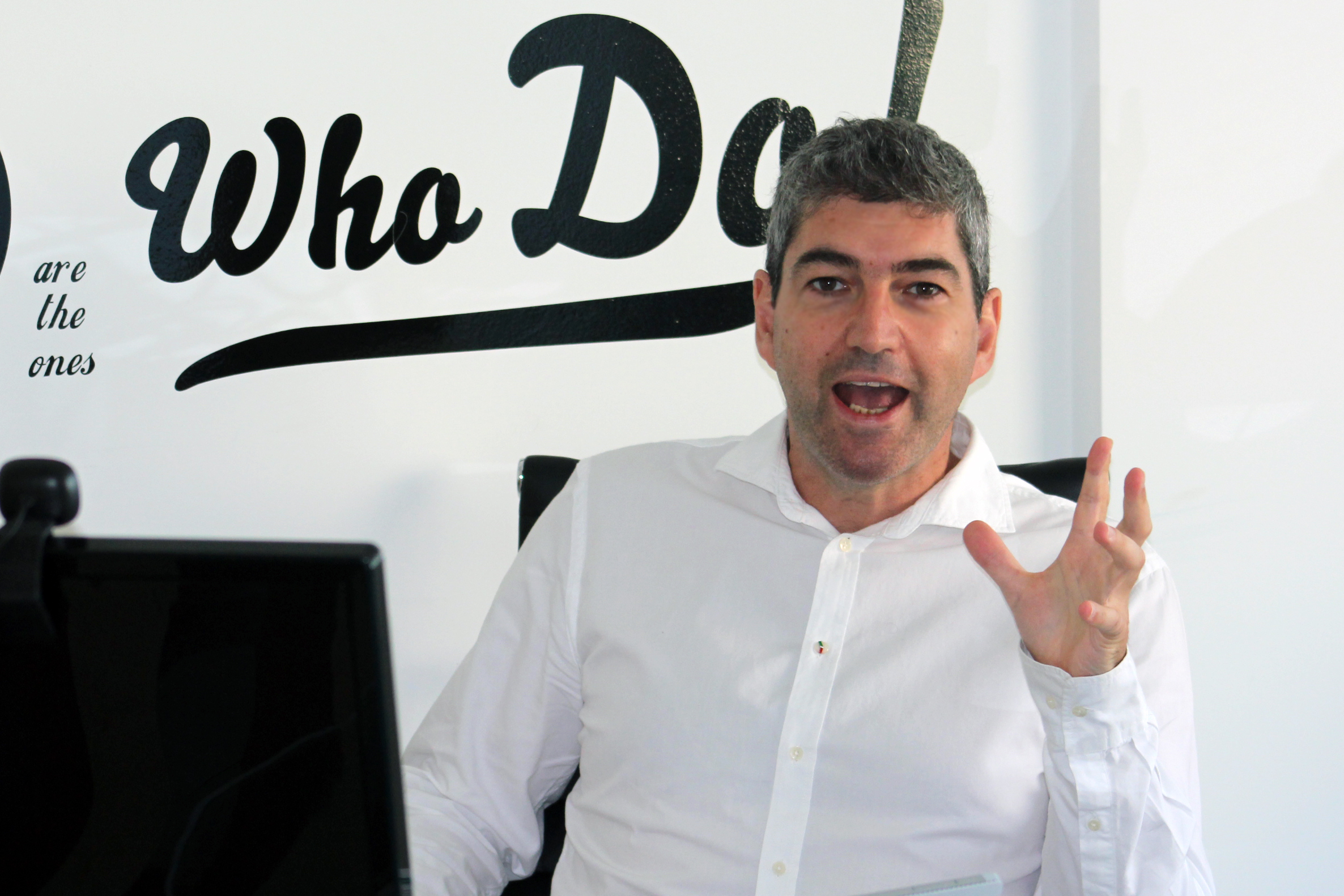- You are here:
- Home
- Connecting Stories
- Jorge Saraiva - DigitalTown

Jorge Saraiva
DigitalTown Vice President for EuropeBeing one of the most active evangelists in Smart Citizens, Jorge Saraiva is one of the special guests in the Connecting Stories series of PARTTEAM & OEMKIOSKS.
Expert with extensive international experience in information technologies in the public and private sector, Jorge Saraiva has been director of large multinational companies such as Infor, IFS and Exact.
At the moment, Jorge Saraiva is the Vice President of the North American multinational DigitalTown and leads the Smart.London project.
Discover exclusively, the story of Jorge Saraiva and DigitalTown company.
1. Who are they, how did it come about and what do they do?
DigitalTown is a publicly traded company based in Seattle, USA. Founded in 1980, it is one of the market leaders in eGovernance solutions (according to GovTech's top100).
Over the past three years, DigitalTown has radically redesigned its Smart Cities strategy.
As a result of its experience in digitizing local administrations (City Councils), DigitalTown found, in the first row, the paradigm shift in which the City Councils were abandoning the traditional "Top-Down" approach (where the Municipality decides and citizens are only users), to become a kind of platform that allows citizens to co-create solutions in the city.
Faced with this paradigm shift (integrated in the Smart City concept), DigitalTown has invested heavily in integrating the citizen as the starting point and center of any city scanning strategy.
The DigitalTown platform, which supports and encourages local communities (an area usually known as Smart Citizens), offers cities the possibility of digitally transforming all businesses, unifying them in a single platform, that of the city ( Smart Economy), transforming the city into a digital destination in the same way as it is physically (aka Smart Destination).
To develop this complex platform, DigitalTown has acquired seven technology companies in the past two years.
2. How does DigitalTown contribute to the development of Smart Cities?
Almost three years after adopting this new strategic direction, DigitalTown is today the world leader in cooperative platforms for cities.
This is exactly where the danger and added value of DigitalTown: digital platforms!
It is a given that the economy is digitizing itself: 85% of hotel bookings are made online, shopping on the internet grows around 23% a year and 54.4% of the global population now has access to the network.
The Market is online. That is why in this gold rush, the biggest selling point is the sellers of shovels and picks. Especially when these lend the utensils in exchange for percentage of the gold found.
That's exactly what happens with digital platforms like Amazon, Uber, Airbnb and etc ... Until the day we all come naturally, these platforms will reign. Not because they add some value in the chain but because they take advantage of the low level of business and media digitization.
Therefore, these platforms boast of being, for example, the largest taxi company without having a single vehicle.
The problem is that these organizations have taken the paradigm of extractive economics to an unsustainable level. Because these platforms draw dividends from the local economy to their headquarters, not paying taxes proportionately or generating jobs, and as they reach monopoly, they use that bargaining power to enslave local economies.
In the end, the cities are losers! Those who lose are the people. In large cities, where this phenomenon has gained an uncontrollable scale are testimonies of this.
In these, airBnB no longer allows to earn "some coppers" with the guest room. The downtown homes available on AirBnB are owned by branch investors and the Ubers belong to rent-a-car organizations.
The impoverishment of cities and the precariousness of the population caused by this extractive business model are not fought with laws or licenses. But this has been the form used by cities and their local governments.
London canceled Uber's license in September last year and Amsterdam was a pioneer in limiting rentals via AirBnB. Many cities replicated similar initiatives.
These initiatives demonstrate two things: the first is that cities (and their governments) still do not know how to live in the digital world, so that traditional ways of dealing with problems and protecting populations do not work in the digital future.
Just as cities plan and organize their physical structure, allowing their citizens to work, consume, undertake, and thrive, they must now, in the digital age, develop a similar plan for their city if it is to prosper!
The way cities thrive in the digital age is to create a cooperative digital platform where citizens, local businesses and multiple stakeholders are shareholders. It is a digital transformation of the city adopting the principles of "shared capitalism" to the detriment of "corporate capitalism".
Cities that do not become digital will be the victims of the digital age. As has happened in previous eras (industrial and agricultural)
With the vision of a future based on "shared capitalism" where smart cities thrive through cooperative platforms, DigitalTown has acquired 23,000 .city cities (such as Famalicão.city) by installing them into its platform which it then makes available to cities. Thus, DigitalTown does not promote itself as a brand ... The brands it promotes are the cities themselves when they are part of the DigitalTown network.
DigitalTown's process is simple: using BlockChain as an engine that guarantees trust and transparency through automation, in each city, it develops a PPPP (Public, Private Partnership with People!) Cooperative where all are shareholders of the digital version of the city!
In this way, the city adopts a digital positioning with the advantage that the revenues generated in the city are reinvested in the city making it thrive.
The impact of DigitalTown on a city is measured by increased quality of life and economic prosperity.
3. He started his professional activity in Smart Cities in 2012. Tell us a little about your journey and about your professional experience. What is your interest in this subject?
My activity in Smart Cities started at an event in Amsterdam known as Social Cities. It was a bottom-up event of "creativists" against how Smart Cities were being implemented. The message of this event was clear: we can only develop a Smart City if we engage citizens in the co-creation of solutions. The alternative is millions of unusable investment.
In addition to people involved in technology, architects, urban planners, sociologists, anthropologists and chamber presidents attended the event that was intended to be construction rather than intervention.
From this event, a movement was born that today leads some cities, projects were born that gave rise to the cities Smart like Eindhoven that led the ranking two years later and was born a startup: engagecitizen that was the first platform of co-creation and of citizen engagement properly dictated
My interest in Smart Cities is people! The future depends on people at all levels (economic, social and political) so a city must be a community platform. Cities have to become collaborative ecosystems in order to thrive. Technologies, are catalysts of change but are not change! Intelligence is in people, not in technology.
However, the platforms I develop connect people around values and ideas to create collective intelligence!

4. Explain to us what you mean by Smart City and how does the modernization of public services broaden the interaction of civil society? How do you find the development of Smart Cities in Portugal and in the World?
Throughout my career in this industry I have been able to observe many different phases: in the beginning, the Smart Cities were nothing more than utilities (LED bulbs, electric buses and sensors), in a second era it became services (eGov, and etc...).
It was at this time that the event took place in Amsterdam: cities invest millions in big suppliers to guess what would be best for people instead of asking people who had on their iPhone more computing power than NASA when it sent a man to moon.
From there, the cities opened up to the population, emerging a third more participative era.
Today, we are entering a new paradigm. The future does not belong to industrial corporations but to creative and innovative ecosystems, that is, cities depend on people and their capabilities, because the industry of the future is not the cheap labor industry (this is going to be robotized!) But is the future of the creative industries. So thriving cities are the ones that attract talent to innovate!
The new Smart Cities paradigm for public services is to transform the city into a platform for collaboration.
Take the case of NEOM: an investment of 500 billion (equivalent to what Portugal produces in five years!) To build a city for the brightest human beings on the planet!
Portugal, with regard to Smart Cities, is a country with very different realities: we are one of the countries with the greatest proliferation of Participatory Budgets but we are also one of the most abusive countries in centralizing policies. Economically, we have a large number of "institutions" that power the new economy through innumerable incubators and similar structures created by the municipalities themselves, but we have enormous difficulties in developing collaborative ecosystems in cities.
In one of my chronicles in the Smart Cities magazine, I have identified the three generations of mayors: those who treat citizens as mere users of their policies, those who consult with citizens encouraging them to participate and give their opinion and those who organize the city to citizens to co-create solutions. In Portugal we have the three types of mayors in active duty.
In short, Smart Cities depend on Smart Mayors but also on Smart Citizens! It is a two-way street ... Just as national councilors must develop a Smart City plan focused on the prosperity of the city and people, the population must also collaborate to support the local authorities in improving the common good: the city.
However, by entering late, Portugal has here the possibility of adopting the latest paradigm and surpassing other cities in the Smart development curve. It is enough to have the intelligence to learn from the mistakes of others!
5. Smart cities are no longer a thing of the future and are not limited to large capitals. What is your opinion on this statement.
I agree! The challenges are not just for capitals but for all cities or regions. The competition in the future will not be between countries (with economic communities and transnational currencies will it make sense to speak in countries to compete economically?).
Capital, however, is more advanced in this context. Lisbon included! But it is at this point that the advantages of smaller means arise.
Unlike large capitals, the smaller means have not yet been invaded or are victims of the extractive economy (yet!). So, have no problem cleaning up but just the opportunity to create the solution! An invaluable advancement for many cities ...
Curiously, Nordic and medium-sized cities in Central Europe (notably the Netherlands, Austria and Luxembourg) have defined this construction as a priority and are now invaluable poles for learning the great.
Again, we did not find Portugal in this trend but it is still very much in time. As long as you do not make the same mistakes and setbacks of your fellow Europeans.
6. Knowing that PARTTEAM & OEMKIOSKS has the possibility to produce digital billboards, self-service kiosks and other technology solutions for Smart Cities, we ask what you think about PARTTEAM & OEMKIOSKS.
More than its production capacity, PARTTEAM & OEMKIOSKS has a fantastic capacity for creating and developing not only products but strategic partnerships. This is the company's DNA and the reason for its success.
In the particular case of Smart Cities, this way of being has a particular relevance. In this industry is not compatible with the paradigm of developing a brand and corporation that impinge products for consumption. Smart Cities is a means of partnership with cities and co-creation with the populations ... It is not the brand but the city and the impact caused in this that defines the quality of the solutions!
By this way of being, PARTTEAM & OEMKIOSKS is a natural ally in the innovation of both urban furniture and above all in interactive communication with the citizen. Hence the future of PARTTEAM & OEMKIOSKS in the Smart Cities industry!
Connecting Stories is a new editorial space led by PARTTEAM & OEMKIOSKS which consists of conducting exclusive interviews, directed at influential personalities who work in different sectors of activity.
The project, conceived by PARTTEAM & OEMKIOSKS, includes the publication of success stories, through small interviews with influencers who want to share details about their projects, opinions, plans for the future, among other subjects.
The idea is to connect stories, share knowledge, develop networking and generate content that can provide new visions, opportunities and ideas.
Founded in 2000, PARTTEAM & OEMKIOSKS is a world renowned Portuguese IT company, manufacturer of indoor and outdoor multimedia kiosks, self-service equipment, digital billboards, interactive tables and other digital solutions, for all types of sectors and industries. To know more about our story, click here.
